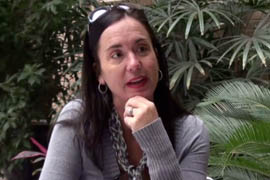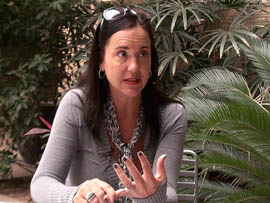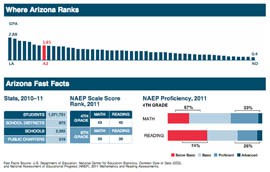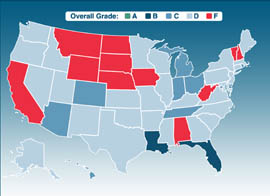Cronkite News has moved to a new home at cronkitenews.azpbs.org. Use this site to search archives from 2011 to May 2015. You can search the new site for current stories.
Arizona education policy gets C-minus; still enough for 8th place
PHOENIX – An advocacy group gives Arizona a C-minus in a national report card on education policy but notes the state has made strides in reform and has room for growth.
In fact, Arizona wound up ranking eighth in the report by StudentsFirst, which graded states on how closely their public school policies follow the group’s platform.
Eleven states received Fs, while none received As.
StudentsFirst, led by former Washington schools chancellor Michelle Rhee, lauded Arizona for building momentum in its public schools by elevating teaching. The report also said Arizona’s grade benefited from recent policy changes, including the adoption of better educator evaluations, new Common Core Standards and increased transparency with school performance information.
Through Arizona’s education system often gets low marks in national ratings, experts here weren’t surprised that the state fared well with StudentsFirst, which they said is fairly conservative in its outlook.
“When you read a report with StudentsFirst’s name at the top, you don’t need to open it because you’re already going to know the types of findings you’ll see – it’s that predictable,” said Audrey Beardsley, an associate professor in Arizona State University’s Mary Lou Fulton Teachers College.
Rebecca Gau, director of the Arizona Governor’s Office of Education Innovation, said the report’s assessment was mostly accurate when looking at the criteria for what the organization values.
She said it was “just nice to see Arizona on top for once,” even if that means a C-minus.
However, Gau said there were a few “glaring errors” lowering Arizona’s ranking, including failing to recognize the state’s Empowerment Scholarship Account for struggling families.
Pearl Chang Esau, president of the education advocacy group Expect More Arizona, said the report provided a solid description of the progress the state is making in public education. But she said Arizona can’t stop there.
“The next two to three years are so important for Arizona to really step up and make sure we didn’t just pass a bunch of policies,” Chang Esau said. “Time will actually tell if we can improve the capacity for schools to achieve at a higher level.”
Tracey Benson, communications director for the Arizona School Boards Association, said it’s hard to compare the report to Arizona’s education-reform plan, which doesn’t fully align with StudentsFirst’s goals.
“StudentsFirst is pushing some very specific policy changes,” she said. “We have our own measures of success.”
Arizona groups such as the Arizona School Boards Association have worked over the past few years on more aggressive plans to improve public education, with the hope of reaching these goals by 2020.
“Our state needs to get students college and career ready and focus on decreasing the achievement gap we know exists,” Benson said.
Critics of StudentsFirst say its platforms of elevating teaching, empowering parents, spending wisely and governing well are unrelated to state policy goals and may not provide the results students need to succeed.
Beardsley said other variables need to be considered when evaluating state performance.
“At the end of the day, [Arizona] still has very low test scores,” she said. “We still have issues with teacher effectiveness and teacher quality, especially in high-need areas. We still have bilingual education students really struggling in some of our schools. We have problems left to address.”











